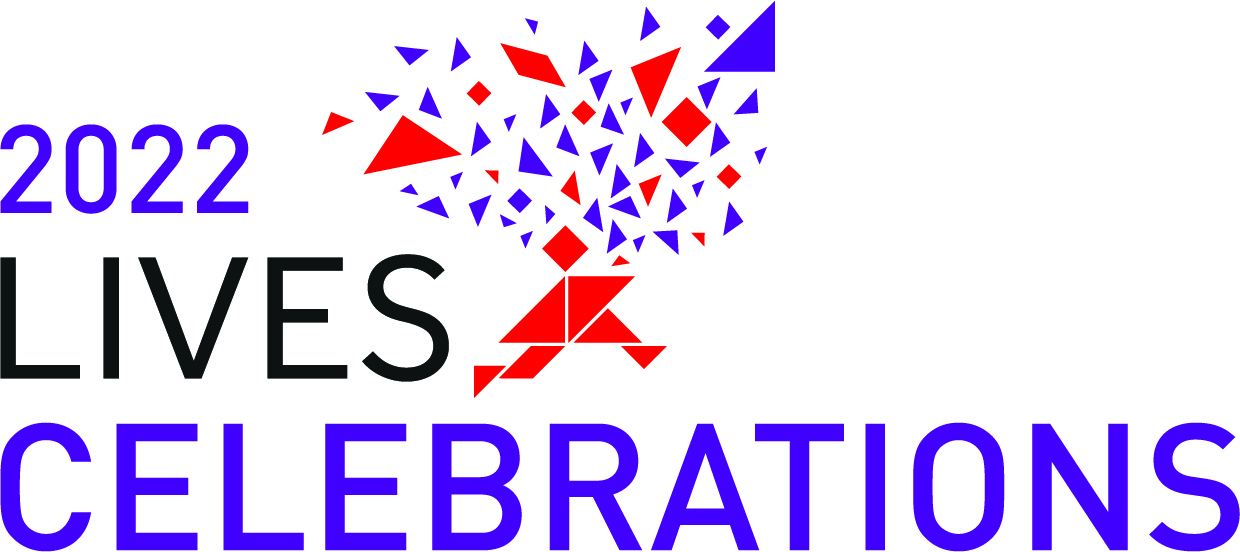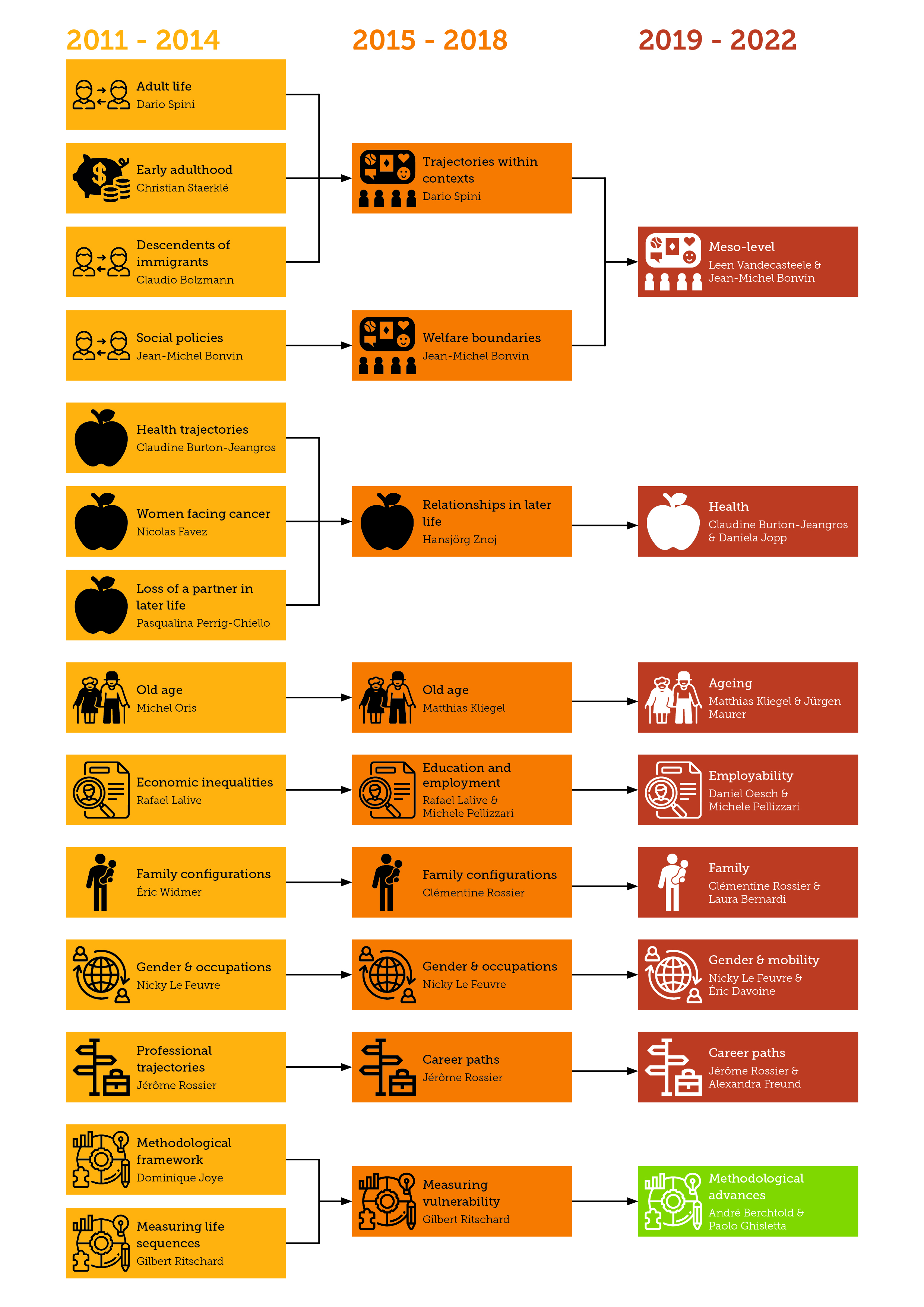2023
With the end of the NCCR and SNSF funding, the LIVES Centre redefines its strategy and programme of activities. This process results in a detailed self-assessment report and an annual operating budget from the Universities of Lausanne and Geneva.
Merger of the LINES (life courses and inequalities) and LIVES (life courses and vulnerability) centres at the University of Lausanne.
2022
Appointment of a new co-direction for the LIVES Centre from 2023. Daniel Oesch and Clémentine Rossier will replace Dario Spini (UNIL) and Eric Widmer (UNIGE) and ensure the continuity of the Centre. 
An intense programme of activities and popularisation measures, the LIVES Celebrations, are being organised to popularise and widely disseminate the results of these first 12 years of research.
2019
In order to ensure the continuity of the NCCR LIVES research activities and projects, the LIVES Centre is institutionalised within UNIL and UNIGE, ensuring the continuation of life course research beyond the end of SNSF funding.
A new visual identity is being defined and gradually implemented, culminating in 2020 with the launch of the new website.

2018
Funding obtained for the 3rd phase of the NCCR LIVES. New definition of the research projects and introduction of cross-cutting questions, to be addressed by all projects.
2014
Funding obtained for the 2nd phase of the NCCR LIVES. Reorganisation of research projects.
2011
The National Centre of Competence in Research LIVES - Overcoming Vulnerability: A Life-Course Perspective (NCCR LIVES) is inaugurated. It studies the effects of the post-industrial economy and society on the development of situations of vulnerability by means of longitudinal and comparative studies. The NCCR LIVES aims to gain a better understanding of the emergence and evolution of vulnerability, as well as the means of overcoming it, in order to encourage the emergence of innovative socio-political measures.
Like all NCCRs, LIVES is evaluated annually by a panel of independent SNSF experts, who provide scientific and managerial recommendations. Every 4 years, this panel decides whether or not to continue funding for a further 4-year phase (see details of research projects for the 3 phases in the right-hand column).
The NCCR LIVES will be funded by the Swiss National Science Foundation (SNSF) for a maximum of 12 years. The biographical trajectories of some 25,000 people will be studied in various fields (health, family, work and institutions).
2010
Acceptance of NCCR LIVES funding. The Swiss Confederation announces the launch of 8 National Centres of Competence in Research (NCCRs), with the aim of promoting interdisciplinary approaches as well as innovative approaches within disciplines. LIVES is the only NCCR in the social sciences of its kind.
2008
Submission of the project to the Swiss National Science Foundation.
Here are the seven interdisciplinary research projects from the current phase of the NCCR LIVES:
- IP1. Meso-level and policy mechanisms of vulnerability (meso-level)
Co-directed by Leen Vandecasteele, Jean-Michel Bonvin - IP2. Health in vulnerable groups: Patterns of resources (health)
Co-directed Caudine Burton-Jeangros, Daniela Jopp - IP3. Life-course mechanisms of vulnerability in old age: The role of multidomain reserves (ageing)
Co-directed by Matthias Kliegel, Jürgen Maurer - IP4. Vulnerability through lack of employment: Firms, inequality, and job loss (employability)
Co-directed by Daniel Oesch, Michele Pellizzari - IP5. Family ties and vulnerability processes: Network-wide properties, agency and life-course relational reserves (family)
Co-directed by Clémentine Rossier, Laura Bernardi - IP6. Gender, mobility and vulnerabilities (gender and mobility)
Co-directed by Nicky Le Feuvre, Eric Davoine - IP7. Resource dynamics to overcoming career and work-related vulnerabilities (career paths)
Co-directed by Koorosh Massoudi, Alexandra Freund
In addition to the research projects, four cross-cutting issues (CCI) characterize the research agenda of the NCCR LIVES. These CCI are the result of the combination of seven research projects (IP) which bring together about 200 researchers from all around Switzerland who conduct interdisciplinary research by mobilizing knowledge from various disciplines (sociology, psychology, demography, economics, social policy) and by developing innovative longitudinal methodologies.
The purpose of these cross-cutting issues (CCI) is to further develop and refine the research agenda of NCCR LIVES in order to stimulate theoretical, methodological and empirical advances in the domains of vulnerability and life-course research. Three of these issues aim at understanding the multidimensional (CCI-1), multilevel (CCI-2) and multidirectional (CCI-3) dimensions of vulnerability. The fourth one (CCI-4) focuses on developing innovative methodological techniques in order to better grasp the nuts and bolts of vulnerability from a life-course perspective.
CCI 1 - Stress and resource dynamics in social interactions and across life domains (multidimensional)
This cross-cutting issue aims to stimulate research focusing on the permeability of stresses and resources across different life-course domains, such as family, work, education, leisure time or well-being trajectories. (More)
CCI 2 - Stress and resource dynamics in social interactions and across analysis levels (multi-level)
This cross-cutting issue explores the dynamics of stress and resilience among interdependent individuals or between individuals and the normative and institutional context in which they are embedded. (More)
CCI 3 - Accumulation of resources and development of vulnerability over the life course (multidirectional)
This cross-cutting issue emphasises the importance of the accumulation of social and economic as well as psychological and physiological resources over the course of life. (More)
CCI 4 - Methodological advances on vulnerability and the life course
This cross-cutting issue develops strategies for innovative longitudinal analyses and new methods to study vulnerability across the course of life, at both individual and population levels. (More)
The second phase of the NCCR LIVES, from 2015 to 2019, had nine reserach projects:
- Trajectories within contexts (IP201) - Felix Bühlmann
- Education and employment (IP204) - Rafael Lalive
- Welfare boundaries (IP205) - Jean-Michel Bonvin
- Gender and occupations (IP206) - Nicky Le Feuvre
- Career paths (IP207) - Jérôme Rossier
- Family configurations and the life course (IP208) - Clémentine Rossier
- Relationships in later life (IP212) - Hansjörg Znoj
- Old age (IP213) - Matthias Kliegel
- Measuring vulnerability (IP214) - Gilbert Ritschard
During the first phase of the NCCR LIVES (2011-2014), the pole consisted of 14 research projects :
- Vulnerability processes in adult life: Cumulative disadvantages, critical events, and socio-psychosocial resources (IP1)
- From youth to adulthood: Descendents of immigrants insertion in the Swiss society (IP2)
- Economic inequalities: Towards pathways out of vulnerability (IP4)
- Overcoming vulnerability to unemployment: Possibilities and limits of the so-called "active" social policies (IP5)
- Vulnerability at the interface of professional and family life: Gender and occupational differentials (IP6)
- Professional trajectories: Impact of individual characteristics and resources, and cultural background (IP7)
- Critical events and family configurations (IP8)
- Facing critical events in early adulthood: A normative approach to vulnerability and life course regulation (IP9)
- Health trajectories and life transitions: A life course approach to health vulnerability (IP10)
- Women facing cancer: Impact of the social suppport (IP11)
- Vulnerability and growth: Developmental dynamics and differential effects of the loss of an intimate partner in the 2nd life half (IP12)
- Behind the democratization of old age: Inequalities within progress (IP13)
- Measuring life sequences and the disorder of lives (IP14)
- Life transitions in context: Towards an integrated methodological framework for studying the impact of critical events (IP15)


